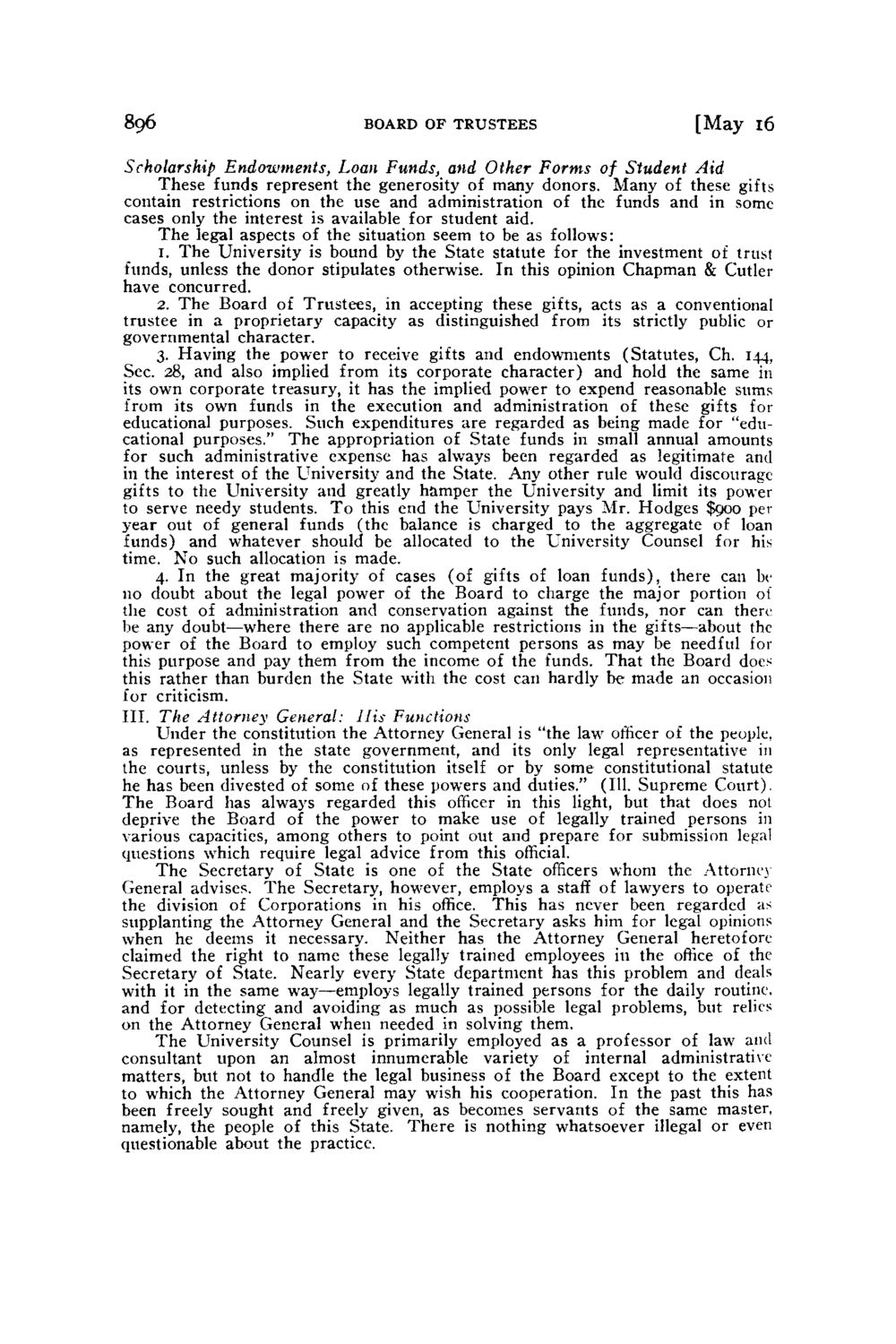| |
| |
Caption: Board of Trustees Minutes - 1942
This is a reduced-resolution page image for fast online browsing.

EXTRACTED TEXT FROM PAGE:
896 BOARD OF TRUSTEES [May 16 Scholarship Endowments, Loan Funds, and Other Forms of Student Aid These funds represent the generosity of many donors. Many of these gifts contain restrictions on the use and administration of the funds and in some cases only the interest is available for student aid. T h e legal aspects of the situation seem to be as follows: 1. The University is bound by the State statute for the investment of trust funds, unless the donor stipulates otherwise. In this opinion Chapman & Cutler have concurred. 2. T h e Board of Trustees, in accepting these gifts, acts as a conventional trustee in a proprietary capacity as distinguished from its strictly public or governmental character. 3. Having the power to receive gifts and endowments (Statutes, Ch. 144, Sec. 28, and also implied from its corporate character) and hold the same in its own corporate treasury, it has the implied power to expend reasonable sums from its own funds in the execution and administration of these gifts for educational purposes. Such expenditures are regarded as being made for "educational purposes." The appropriation of State funds hi small annual amounts for such administrative expense has always been regarded as legitimate and in the interest of the University and the State. Any other rule would discourage gifts to the University and greatly hamper the University and limit its power to serve needy students. T o this end the University pays Mr. Hodges $900 petyear out of general funds (the balance is charged to the aggregate of loan funds) and whatever should be allocated to the University Counsel for his time. No such allocation is made. 4. In the great majority of cases (of gifts of loan funds), there can be no doubt about the legal power of the Board to charge the major portion of the cost of administration and conservation against the funds, nor can there be any doubt—where there are no applicable restrictions in the gifts—about the power of the Board to employ such competent persons as may be needful for this purpose and pay them from the income of the funds. That the Board does this rather than burden the State with the cost can hardly be made an occasion for criticism. I I I . The Attorney General: His Functions Under the constitution the Attorney General is "the law officer of the people, as represented in the state government, and its only legal representative in the courts, unless by the constitution itself or by some constitutional statute he has been divested of some of these powers and duties." (111. Supreme Court). T h e Board has always regarded this officer in this light, but that does not deprive the Board of the power to make use of legally trained persons in various capacities, among others to point out and prepare for submission legal questions which require legal advice from this official. T h e Secretary of State is one of the State officers whom the Attorney General advises. T h e Secretary, however, employs a staff of lawyers to operate the division of Corporations in his office. This has never been regarded as supplanting the Attorney General and the Secretary asks him for legal opinions when he deems it necessary. Neither has the Attorney General heretofore claimed the right to name these legally trained employees in the office of the Secretary of State. Nearly every State department has this problem and deals with it in the same way—employs legally trained persons for the daily routine. and for detecting and avoiding as much as possible legal problems, but relies on the Attorney General when needed in solving them. T h e University Counsel is primarily employed as a professor of law and consultant upon an almost innumerable variety of internal administrative matters, but not to handle the legal business of the Board except to the extent to which the Attorney General may wish his cooperation. In the past this has been freely sought and freely given, as becomes servants of the same master, namely, the people of this State. There is nothing whatsoever illegal or even questionable about the practice.
| |